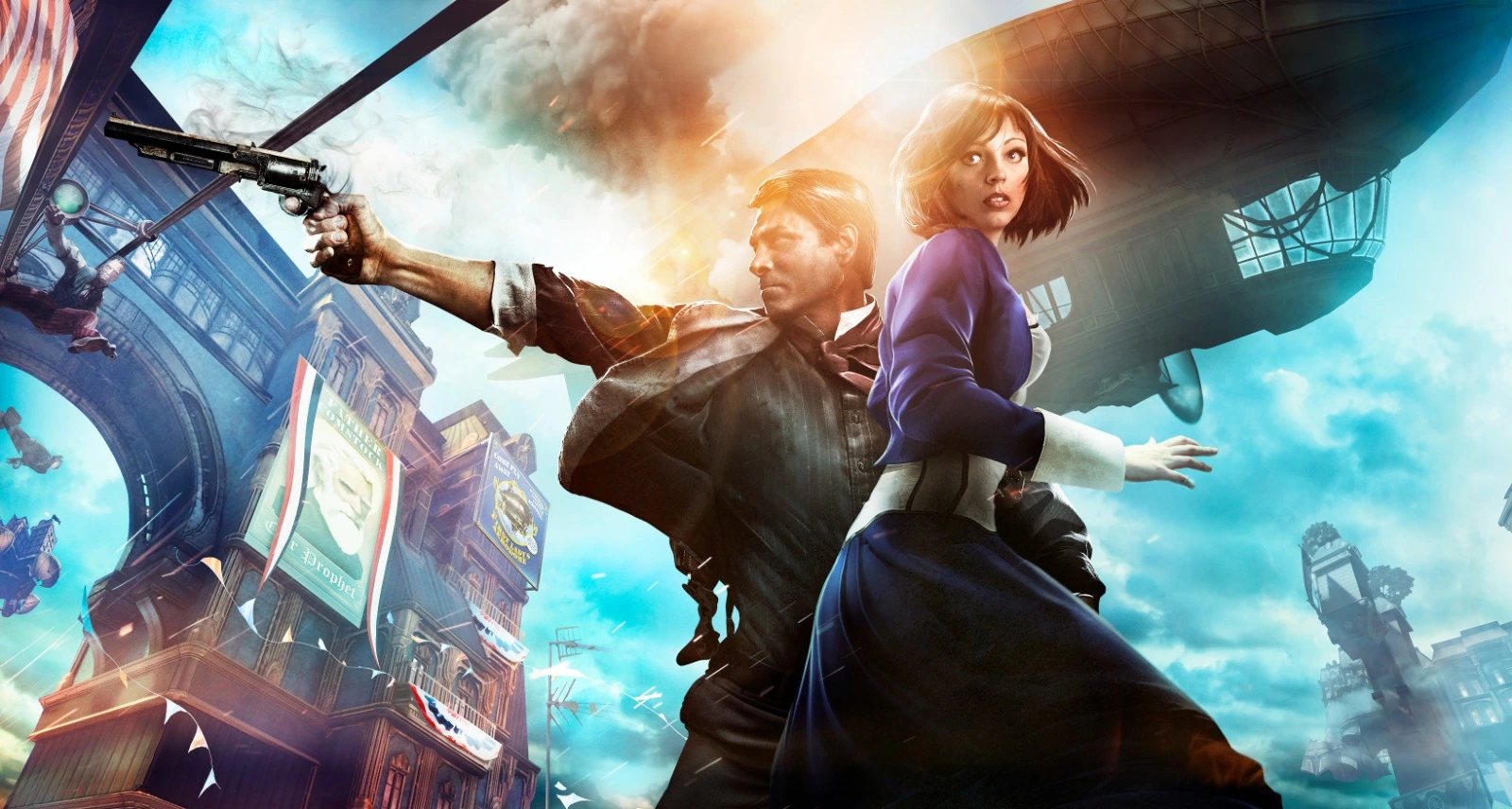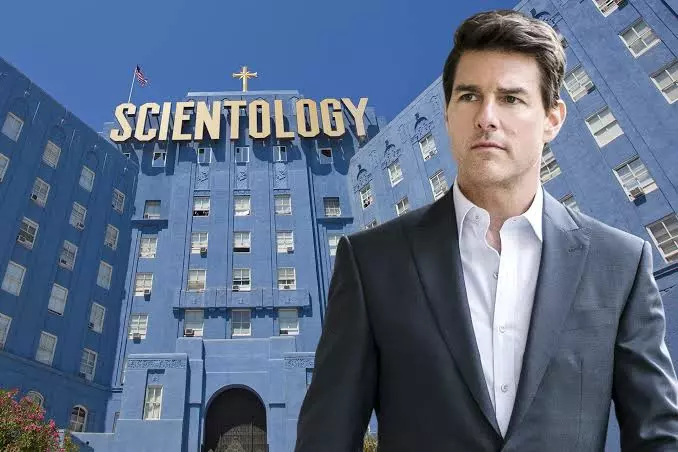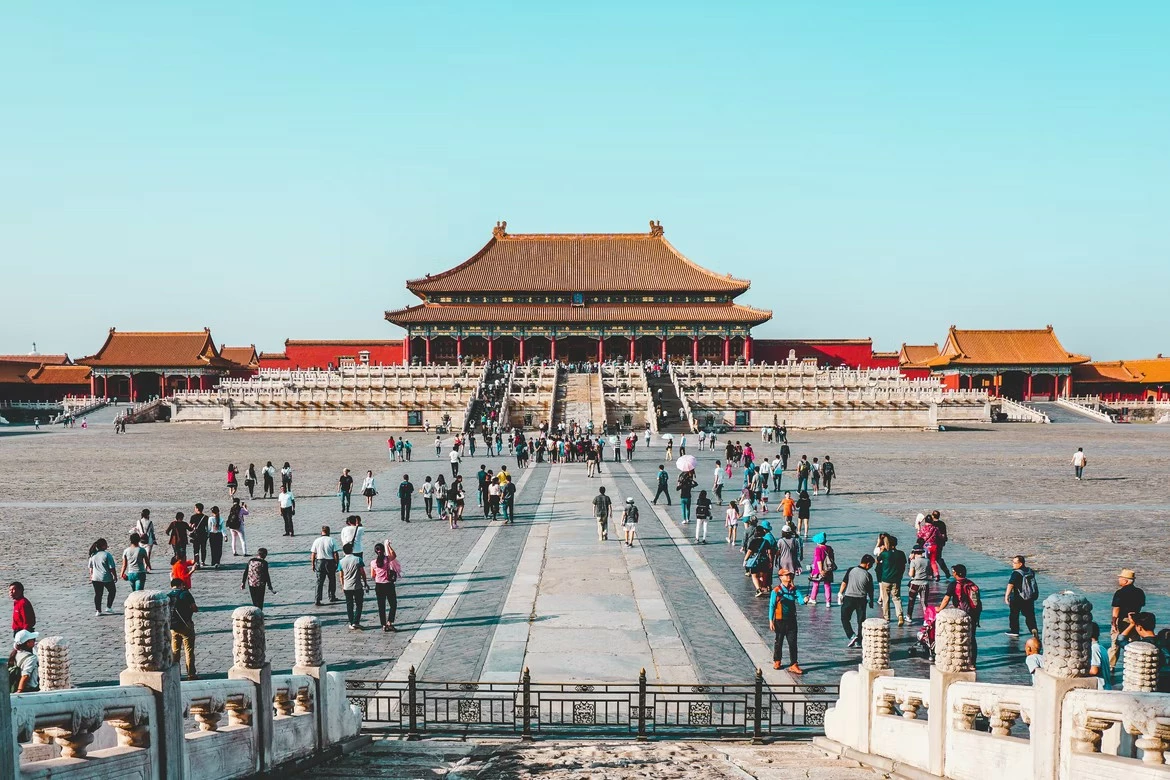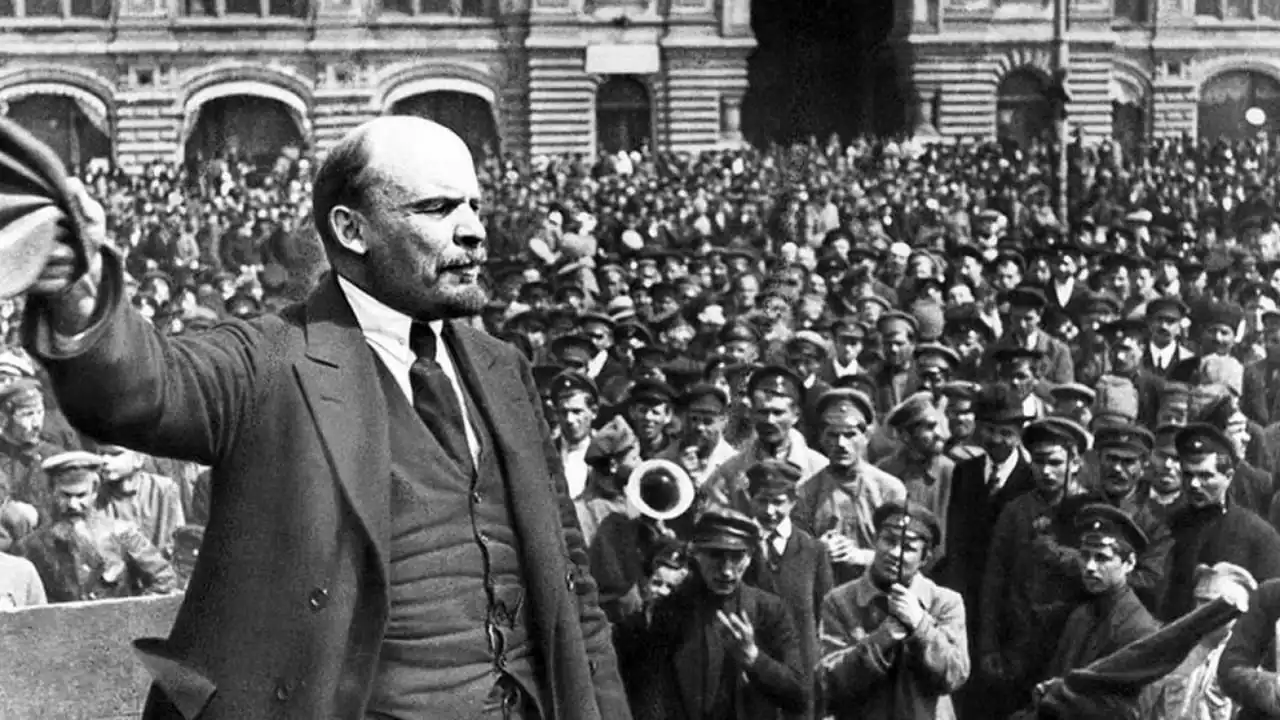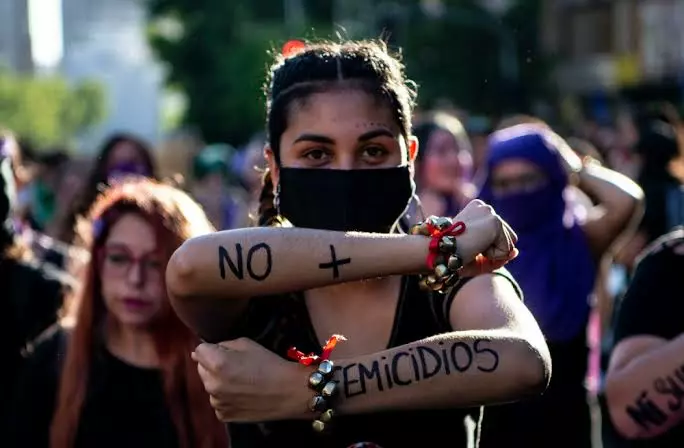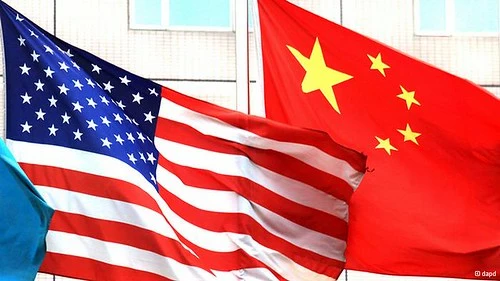On the 10-year anniversary of BioShock Infinite, the story driven shooter still stands out as one of the most notable titles in recent memory, often held up as an example of how video games are a form of art. Like any other medium, the narratives set in video games have a profound impact instilling morality and shaping our consciousness while playing. Just as Infinite opens tears into other worlds, so too does it open to our own world.
BioShock Infinite is undeniably a visually stunning work and throws quite a lot at the player, with so much to take in, it’s easy to get caught up in the parts that are genuinely great while missing some of the underlying messages that are less so, especially for younger impressionable players. With the modern gaming industry surpassing film as the preeminent medium of entertainment in the Capitalist world, it is very important for us to analyze this art form, how it can uphold such structures, even while attempting to critique them. This game is a perfect example because it has such a mixed legacy. Despite aiming to critique American Nationalism and Anglo-Saxon racialism, the game fundamentally reaches many reactionary conclusions about the nature of a Socialist revolution. The game came out in 2013, in a renewed time of Capitalist crisis in the United States, coming off the heels of the 2008 financial collapse, and just before the resurgence of Black Liberation politics with Ferguson and the reaction of White Nationalist politics with the Alt-Right. Race and Class too permeate its turn of the century fictional setting of Columbia, the floating city in the sky.
Columbia is based off of a real-world exhibition featured at the Chicago World Fair in 1893, also known as the White City. The name “Columbia” derives from an image of Christopher Columbus in drag, as the feminine personification of America. In-game Columbia is an air born version of this exhibit which was paraded around the globe as a form of soft power, to be celebrated as a beacon of American Exceptionalism, until it was recalled by the US Government, and then subsequently seceded from the Union to preserve the most reactionary elements of US Americanism. A major influence for the story was the book Devil in the White City by Erik Larson, detailing the intertwining lives of an architect and serial killer around the World Fair, an apt inspiration to a first-person shooter in a setting that is the embodiment of the hypocritical nature of the ascendent American Century. This same duality of the beautiful and the murderous bleeds through the mesmerizing landscape of the cloud city in BioShock Infinite. We witness how Columbia deconstructed to a point of chaotic dread that is all encompassing, in parallel with the agonizing demise of our female companion’s joyous spirit to a solemn resignation of inevitability. But with the unraveling of Columbia too comes the unraveling of the plot as the game goes on to have personal stories overshadow the original critiques that were meant to be the main critiques in BioShock Infinite.
What the game really revolves around is the interpersonal relationship between protagonists Booker DeWitt and Elizabeth Comstock. Booker is a gun-for-hire with a sordid past, having served in the US Army at a young age committing atrocities against First Nations, as well as having worked as Pinkerton strike-breaker to suppress organized labor in New York. The game begins with him being rowed towards a Lighthouse off the coast of Maine in 1912. He has taken up one last job from a mysterious client in order to pay off his gambling debts in return for rescuing (or kidnapping) an innocent girl named Elizabeth who is held up in Columbia. What starts out as just a job develops into a paternal bond between Booker and Elizabeth, as he eventually discovers that she is his long-lost daughter, Anna DeWitt. Booker had actually sold her as a baby to pay off his debts. The initial mantra of “bring us the girl and wipe away the debt” takes on a whole new dimension (no pun intended) by the story’s conclusion. The soundtrack features beautiful acoustic and choral renditions of the Christian hymn “Will the Circle Be Unbroken” to accentuate their heart wrenching story. This part of the game is really well done, with Elizabeth praised as an exceptional companion character, and truly is the beating heart of Infinite, building on the father-daughter dynamic seen in previous BioShock games. Where this focus hinders the overall game is when their interpersonal story either abandons or undermines addressing the systemic problems in Columbia.
Columbia is understood from the opening sequences as sick society that must be confronted by our main protagonist in order to not only free Elizabeth, but everyone from Comstock’s maniacal grasp. While the entire exposition of the game focuses on revealing Columbia as a horribly racist and hypocritical city, much of that effort is undone in the game’s second half. The game ultimately takes us away from what should be a natural conclusion about liberation for the oppressed peoples in the cloud city.
The two warring factions in Columbia are the Founders and Vox Populi. The Founders are a reactionary circle around the False Prophet Zachary Hale Comstock who uses a Christian-influenced religion (not quite Baptist Protestantism, but a heterodox fusion with American Nationalism and Anglo-Saxon racialism that has often been compared to the Mormon Church of Ladder Day Saints) to claim moral authority over Columbia. The Vox Populi represent the downtrodden masses of the Columbia, Latin for Voice of the People, that are comprised predominantly of African, Chinese, and Irish labor, found hyper-exploited in the slums of Columbia’s industrial district, Finkton. While the Vox are nominally referred to as “Anarchists” by the Founders, we must understand this is asserted through counterrevolutionary propaganda, potentially with “Anarchist” being synonymous with an epithet for being against the Founder’s system, hence whether the Vox truly are ideological Anarchists is not clear. What is clear, is that the Vox serves as the stand in for Socialist Revolution. Infinite unfortunately goes out of its way to equate these two factions.
Booker and Elizabeth initially strike a deal with Daisy Fitzroy, the charismatic Afro-Columbian Revolutionary leader of the Vox Populi, following their first failed attempt at escaping Columbia they realize they need to make alliances to make it out alive. They are tasked with supplying the Vox with firearms in exchange for assistance in escaping from Comstock. However, Booker cites numerous times a distrust for Daisy to preface players for dissociating from the cause of liberation. Booker is not truly committed to the cause, explicit that this is purely an alliance of convenience, insisting “look I ain’t looking for a fight” where Daisy responds “there’s already a fight here DeWitt, the question is which side are you on?”
Following this exchange, there is short series of dimension hopping/merging, depending on what quantum theory interpretation you may have, that is beyond the scope of this review, we essentially enter a timeline where the Vox Revolution is in full swing. We get a glorious ten minutes of gameplay living a Red Revolution in Columbia as we assist the Vox in overthrowing the Founders. The elation from this passage is short lived. In nearing the moment of victory, Daisy randomly turns on Booker and Elizabeth without any serious reason, other than to serve as plot device, emphasizing the absurd statement from Booker that “the only difference between Comstock and Fitzroy is the way you spell the name.” This anti-climactic turn is less of plot twist and more a plot ruiner. Elizabeth then has to kill Daisy as part of her character arc, going from girl to woman. Here is where Infinite completely bungles the notion of revolution in regards to how to overcome oppressive structures and systems. The insistence that this “had to happen” to advance the plot for Elizabeth is something that reduces the revolutionaries and the oppressed masses to being obstacles to our protagonists as opposed being the main drivers of history. Booker and Elizabeth are now firmly placed outside of the dimension of class struggle and supposedly exist in a dimension of their own (quite literally in-game), not only against Comstock’s faction, but for the entirety of Columbia.

Defenders of the “Evil Vox” arc will make the argument deferring to the game’s attempts at incorporating quantum theory, referencing the multiple timelines factor. They claim that the game didn’t intend for the Vox to be bad in all the timelines, but only the one we play. However, since this is the timeline in-game, we will treat the plot as linear here, for all intents and purposes, as this is the timeline the writers chose to show the player to portray the nature revolution. Here the Vox are casted as “too radical,” but in what timeline would opposing the Founder’s system not be considered radical? While there is no issue with showing certain strands of harmful ultra/adventurism within a revolutionary movement, the problem with the portrayal here is that the game maps this onto the entire cause, wholesale. There are no alternatives, condemnations are not confined to a supposedly corrupt leader, but to every single member of the Vox Populi, depicting them as the vile masses. Now the revolutionaries are just casted as more enemies who we proceed to gun down in equal measure to the Founder remanent in our escape from Columbia. This leaves a sour taste that evaporates the thrill of some of Infinite’s earlier levels like Murder of Crows where you take on Columbia’s the equivalent to the Klu Klux Klan, the Order of the Ravens. Turning around and doing the same to the Vox, instilling the notion that the revolutionaries are no better than the sky Klan or the Founders, makes it all feel pointless, and also diminishes any desire to replay knowing this context of what is to come. The “enlightened centrist” take framing the active struggle of the people, comparing revolution and liberation with reaction and racism, summed up as a politically neutral “authoritarianism,” has a profound impact on many players who internalize these narratives, narratives we see the Imperialists make all of the time in the real world.
Likewise, just as the portrayal of Socialist revolution had only one representation, negative so too Christianity has been depicted as one dimensional in the game. A major plot being how the man who accepted Baptism, a spiritual rebirth, was painted as the villain, more on this later, and nothing more than a charlatan. This greatly offended a lot of Christians when the game came out. Some notable instances included a Christian game developer almost walking out on production, as well as prominent story of a player who demanded a refund upon witnessing the Baptism that is portrayed as cultish in the opening scenes upon entering Columbia. Christianity is featured in the game only as an instrument of oppression as opposed to an inspiration for liberation. This is an anachronistic take on real world events both past and present. Looking at the United States, prominent leaders of Slave Revolts of Enslaved Africans including Denmark Vessey, Nat Turner, and Gabriel Prosser, all drew heavily from Christianity. These men were the equivalent of Daisy Fitzroy’s of their day, and even White Abolitionists like John Brown and Newton Knight were men of the Faith, but in the game only the sinister False Prophet Comstock uses the Faith as doctrine of control. Sure there were amendments in Colonizer Christianity of the Slave Masters writing the Slave Bible in response to these uprisings to instill subservience, as well as a score of other perversions during the Colonization of the Americas, but it cannot be denied the role of Christianity in these Slave Revolts and other Christian influenced liberation movements in Latin America such as Liberation Theology, in line with the original essence of the Faith, after all it was Jesus Christ who Himself opposed the Pharisee ideology of usury and banking that informs the modern Capitalist system today.
Ultimately, the racism portrayed in Bioshock Infinite is only condemned insofar as it being meanspirited, with cartoonish depictions of its real impact at the July 6th Raffle, stopping short at validating the necessity of overturning a hyper-exploitative system that holds a real material impact on the suffering masses in the underbelly of Columbia. It’s not even a “Race War” as some Pro-Founder fans espouse, as there are numerous Euro-Columbians in Finktown who partake in the Class War against Fink, Comstock, and the Founders. When it comes to those fighting for their rights, Elizabeth herself even expresses a romantic admiration of the European Republican Revolutions of 1848, with her reading Les Misérables by Victor Hugo, as she actively points out the injustices in Columbia prior to Vox Revolution. The message is meant to dissuade a naturally revolutionary-minded young person like her who may be playing the game that these means of emancipation will always end in extremism… as revolution type happenings will happen in a revolution. In Booker’s own words “What did you think was going to happen?” The irony of this is the same violence employed by the Vox against the Founders is what Booker is doing on a personal level to protect Elizabeth throughout the entire duration of the… first person shooter! What is the game teaching us really? On the surface level, it is basically advocating to be a lone-wolf mass shooter, that your personal battles supersede that of the world around you, not that they are integrated into a wider struggle for liberation of all peoples.
Lastly, some critics of the game who may share many of the above points in this piece have a tendency to flatten Booker DeWitt’s character. They will often erroneously refer to him simply as a generic “White Male” protagonist characteristic of this genre of games with lots of guns and little depth, but he actually has a very nuanced backstory with regards to both Whiteness and Indigeneity quintessential to understanding his place in Columbia. Booker DeWitt is a man of mixed European and Indigenous descent with lineage from the Sioux. A more accurate comparison of his character would with Ratonhnhaké: ton (Connor Kenway) from Assassin’s Creed III who also grapples with his mixed identity while at the forefront of the American frontier. Booker’s Northern Mestizo background is very relevant the whole prism of analyzing American Nationalism in Infinite even if the game does not do so in the fullest, there is still a lot here that’s quite novel in video game story telling. During his time in the US Army, Booker was nicknamed “the White Injun” for scalping and burning his Lakota cousins to prove his US Patriotism when challenged to participated in the 1893 Massacre of Wounded Knee. To further complicate his PTSD, he was around his mid-teens when all of this happened, not yet a fully mature man, and not doubt could not grow into a healthy one after this happened. His actions led him to a life alcoholism and gambling to numb the pain and drown away his guilt, hence his accumulation of debts in more way than one. Booker admits throughout the game that he has not been a good person in the past, however in grappling with his regrets and ultimately trying to do the right thing to save Elizabeth, he comes across as sympathetic character, many can relate in some way to having regrets or things they wish they could have changed, he is someone already torn apart for what he’s done more than any judgement others could give him save God. In fact, it was his own accepting/rejection of Baptism after Wounded Knee that supposedly caused a split in timeline according to in-game the quantum theory where his other self would go on to become the False Prophet Zachary Comstock. The whole game was him was fighting himself.
“He’s Zachary Comstock.” “He’s Booker DeWitt.” “No, I’m both.”
Booker must finally must reconcile with this split order to end all the timelines. While the buildup and payoff can be debated how comprehensive it really was, it still remains a compelling concept, despite a somewhat rushed reveal in the game’s end. The idea of the two possible ways Booker tried to reconcile his actions at Wounded Knee was fascinating, the one who internalized it, embodying American Nationalism to such an extreme he built a monument in the sky to mask his own sins, and the other who drowned in them, pushed it away until he couldn’t, but in the end he really didn’t fully connect everything. The game misses the chance for a real reconciliation with his past. After killing Comstock on his airship, the final level has you finish off the remainder of the Vox Populi using the False Prophet’s own enforcer the Songbird, essentially stepping into his shoes proving you’re still literally the same person! Based on their own presumptions against the revolutionaries, it is unlikely the writers even realized they were doing and this is rarely discussed, so this meta level of awareness is likely an unconscious product of the bias in the art.
Since the release of the game, the trope of multiverse and “end the timeline” has increasingly been featured more in works of film and television. There is a near infinite number of issues with this analysis in terms of potential plotholes alone for storytelling, but the most important is that in the real world we have one timeline we must work with, an accumulation of all the decisions ever made in history. Wishing for a different timeline based going back to change one or two past events in the wider river of human history is not possible and is not a viable solution, especially for systemic issues. Why focus on the Baptism? Why not focus on the actual atrocity at Wounded Knee? Or how Booker was even ensigned to the army at such a young age? Or all the micro events that led to Booker’s existence being where he was as a displaced Northern Mestizo boy likely orphaned and abused in New York? And that’s where we’re talking about the system and not the individual. That’s what this game and all “end the timeline” based stories miss is that real world analysis that looks at the system. Booker isn’t really given a real chance, nor is the player, to change the present via active struggle against the system, even if it’s one a version of him had a large hand in creating. What the game levels as a genuine answer to pressing problems in society is basically telling the man to take his own life which rightly makes players feel depressed and alone. We can’t change the past, but we can turn things around, what we can change is our path today to be on a better one to be there for the challenges ahead.
At the end of his journey in Infinite, Booker accepts his past mistakes and lets Elizabeth drown him in a moment akin to a Baptism, knowing he has saved her is enough for him to finally rest, ending all the timelines. What should have been a bittersweet moment where our protagonist should finally at peace, instead comes across as just feeling resigned to the idea of predestination that none of our choices really matter, and the score is somewhat unsettling, not giving the catharsis one would hope. This ending really was more just on the bitter side, as the game does not let him side with the revolutionary forces, something that could have truly been a final redemption for Booker DeWitt. There is the propensity for all to change and fight for what’s right, in spite of all he’s done as a young man, at the very least we’ve seen him try to do right by his daughter, we see that flicker of good in Booker, who much like BioShock Infinite could have become something so much more.
Editor's Note:
The views and informations expressed in the article are solely those of the author and may or may not reflect the views of The International. We believe in providing a platform for a range of viewpoints from the left.
"The International" belongs to you.✕
Please take a moment to read this. We apologize for any interruption, we want you to know "The International" seeks your valued support at this time. We've proudly served as a pioneering online platform, delivering ad-free media content. With only 2% of our readers opting for a subscription, any contribution you choose holds immense significance—whether it's an annual fee of $25 or a monthly payment of $2.5. — The "The International" Team, committed to providing you with enlightening perspectives. We want to highlight that this sum is even less than what you'd spend on a cup of coffee, yet it greatly aids in sustaining our efforts to perpetuate and enhance your esteemed initiative.
